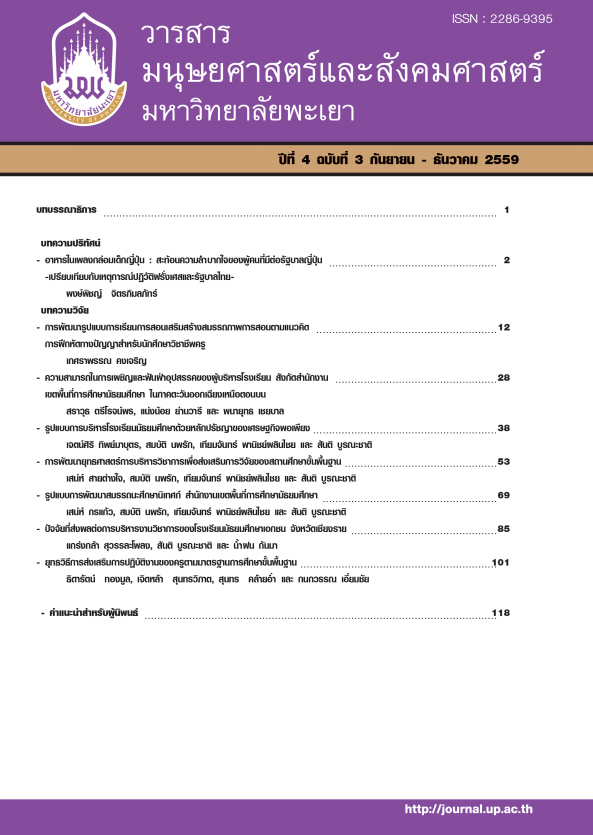The Encouragement Tactics for Teachers Performance According to the Basic Education Standards
Keywords:
Tactics, The Encouragement For PerformanceAbstract
The objectives of this research are: 1) to study the influence factors of teacher’s performance in accordance with the Standards for Basic Education 2) to create encouragement tactics of teacher’s performance 3) to evaluate the feasibility of encouragement tactics of teacher’s performance.
The 3 procedures of this research are: 1) Studying the conditions and the influence factors of teacher’s performance in accordance with the Standards for Basic Education through analysis and synthetic of related documents and literature reviews to get Latent and Observed variables. The questionnaire is used as tool to request opinions of secondary school teachers and used Statistical analysis of SEM program LISREL. 2) Using the results from the 1st step to create the encouragement tactics of teacher’s performance and considering the suitability by focus group discussion. 3) The feasibility is evaluated by questionnaire and interviewing 128 and 9 directors orderly. The results of the research are:
1) The influence factors of teacher’s performance in accordance with the Standards for Basic Education consist of director feature, teacher feature and the organization climate.
2) The encouragement tactics of teacher’s performance consist of 3 tactics which are tactics to encourage the director qualitative management, the teacher’s 5 mental developments and creating organization climate.
3) The evaluation of the encouragement tactics of teacher’s performance feasibility is found at the high level. And 9 directors from interviewing about the encouragement tactics of teacher’s performance the said to be done by developing team-work, the availability of media equipment for teaching and technology. There must be participative administration between director, teacher and educational staffs.
References
สำนักทดสอบทางการศึกษา. สำนักงานคณะกรรมการการศึกษาขั้นพื้นฐาน .แนวทางการประเมินคุณภาพตามมาตรฐานการศึกษาขั้นพื้นฐานเพื่อการประกันคุณภาพภายในของสถานศึกษา. กรุงเทพฯ: โรงพิมพ์สำนักงานพระพุทธศาสนาแห่งชาติ; 2554.
สุทัศน์ ธิยานันท์, การพัฒนารูปแบบการบริหารผลการปฏิบัติงานของครูสังกัดสำนักงานเขตพื้นที่การศึกษาประถมศึกษา. ดุษฎีนิพนธ์ ปรัชญาดุษฎีบัณฑิต สาขาวิชาการบริหารการศึกษา มหาวิทยานเรศวร; 2556.
วิทยากร เชียงกูล, การแก้ปัญหาและการปฏิรูปการศึกษาอย่างเป็นระบบองค์รวม. กรุงเทพฯ: ห้างหุ้นส่วนจำกัด วี.ที.ซี.คอมมิวนิเคชั่น; 2550.
สำนักงานเลขาธิการสภาการศึกษา. ตัวแปรที่มีอิทธิพลต่อผลสัมฤทธิ์ทางการเรียนของนักเรียนระดับการศึกษาขั้นพื้นฐาน. รายงานวิจัย. กรุงเทพฯ: กระทรวงศึกษาธิการ; 2550.
สุวิมล ติรกานันท์. การวิเคราะห์ตัวแปรพหุในงานวิจัยทางสังคมศาสตร์. กรุงเทพฯ: จุฬาลงกรณ์มหาวิทยาลัย; 2553.
อุทัย บุญประเสริฐ. แนวทางการบริหารและจัดการศึกษาในรูปแบบการบริหารโรงเรียนเป็นฐาน (School Based Management). กรุงเทพฯ: คุรุสภาลาดพร้าว; 2543.
ธีระ รุญเจริญ. ความเป็นมืออาชีพในการจัดและบริหารการศึกษา. พิมพ์ครั้งที่ 6. กรุงเทพฯ: นวสาส์นการพิมพ์; 2553.
เสริมศักดิ์ วิศาลาภรณ์. วิสัยทัศน์ของผู้บริหารการศึกษา. ประมวลสาระชุดวิชาประสบการณ์ วิชาชีพมหาบัณฑิตบริหารการศึกษา หน่วยที่ 1. กรุงเทพฯ:มหาวิทยาลัยสุโขทัยธรรมาธิราช; 2538.
อนิวัช แก้วจำนง. หลักการจัดการ. พิมพ์ครั้งที่ 2.สงขลา: นำศิลป์โฆษณา; 2552.
สมคิด บางโม. องค์การและการจัดการ. พิมพ์ครั้งที่ 5. กรุงเทพฯ: วิทยพัฒน์; 2555.
ยนต์ ชุ่มจิต. ความเป็นครู. พิมพ์ครั้งที่ 5.กรุงเทพฯ: โอเดียนสโตว์; 2555.
ดวงเดือน พันธุมนาวิน. ทฤษฎีต้นไม้จริยธรรม. พิมพ์ครั้งที่ 3. กรุงเทพฯ: สถาบันบัณฑิตพัฒนบริหารศาสตร์; 2538.
Kohlberg, L. Moral stages and moralization. New York: Holt, Rinehart and Winson; 1976.
ไพฑูรย์ สินลารัตน์. คิดเพื่อครู. พิมพ์ครั้งที่ 1.กรุงเทพฯ: จุฬาลงกรณ์มหาวิทยาลัย; 2559.
วิไล ตั้งจิตสมคิด. ความเป็นครู. พิมพ์ครั้งที่ 4.กรุงเทพฯ: โอเดียนสโตว์; 2557.
ภารดี อนันต์นาวี. หลักการ แนวคิด ทฤษฎีทางการบริหารการศึกษา. พิมพ์ครั้งที่ 4. ชลบุรี: สำนักพิมพ์มนตรี; 2555.
โกวิทย์ กังสนันท์. องค์การและการบริหาร. พิมพ์ครั้งที่ 1. กรุงเทพฯ: สถาบันบัณฑิตพัฒนบริหารศาสตร์; 2527.
วันชัย มีชาติ. การบริหารองค์การ. พิมพ์ครั้งที่ 5.กรุงเทพฯ: จุฬาลงกรณ์มหาวิทยาลัย; 2555.
Downloads
Published
How to Cite
Issue
Section
License
ผู้นิพนธ์ต้องรับผิดชอบข้อความในบทนิพนธ์ของตน มหาวิทยาลัยพะเยาไม่จำเป็นต้องเห็นด้วยกับบทความที่ตีพิมพ์เสมอไป ผู้สนใจสามารถคัดลอก และนำไปใช้ได้ แต่จะต้องขออนุมัติเจ้าของ และได้รับการอนุมัติเป็นลายลักษณ์อักษรก่อน พร้อมกับมีการอ้างอิงและกล่าวคำขอบคุณให้ถูกต้องด้วย
The authors are themselves responsible for their contents. Signed articles may not always reflect the opinion of University of Phayao. The articles can be reproduced and reprinted, provided that permission is given by the authors and acknowledgement must be given.








